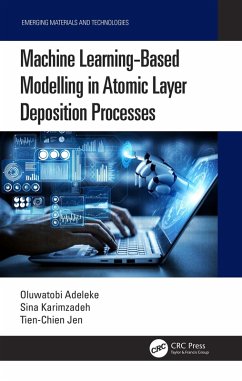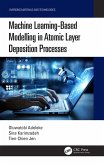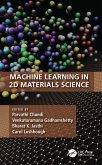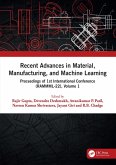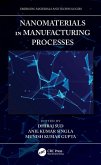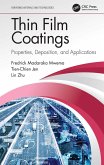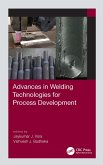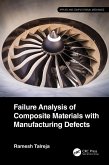Oluwatobi Adeleke, Sina Karimzadeh, Tien-Chien Jen
Machine Learning-Based Modelling in Atomic Layer Deposition Processes (eBook, ePUB)
178,95 €
178,95 €
inkl. MwSt.
Sofort per Download lieferbar

89 °P sammeln
178,95 €
Als Download kaufen

178,95 €
inkl. MwSt.
Sofort per Download lieferbar

89 °P sammeln
Jetzt verschenken
Alle Infos zum eBook verschenken
178,95 €
inkl. MwSt.
Sofort per Download lieferbar
Alle Infos zum eBook verschenken

89 °P sammeln
Oluwatobi Adeleke, Sina Karimzadeh, Tien-Chien Jen
Machine Learning-Based Modelling in Atomic Layer Deposition Processes (eBook, ePUB)
- Format: ePub
- Merkliste
- Auf die Merkliste
- Bewerten Bewerten
- Teilen
- Produkt teilen
- Produkterinnerung
- Produkterinnerung

Bitte loggen Sie sich zunächst in Ihr Kundenkonto ein oder registrieren Sie sich bei
bücher.de, um das eBook-Abo tolino select nutzen zu können.
Hier können Sie sich einloggen
Hier können Sie sich einloggen
Sie sind bereits eingeloggt. Klicken Sie auf 2. tolino select Abo, um fortzufahren.

Bitte loggen Sie sich zunächst in Ihr Kundenkonto ein oder registrieren Sie sich bei bücher.de, um das eBook-Abo tolino select nutzen zu können.
This book describes the application of machine learning modelling approaches in atomic layer deposition and presents detailed information on modelling, optimization, and prediction of the behaviour and characteristics of ALD for improved process quality control.
- Geräte: eReader
- mit Kopierschutz
- eBook Hilfe
Andere Kunden interessierten sich auch für
![Machine Learning-Based Modelling in Atomic Layer Deposition Processes (eBook, PDF) Machine Learning-Based Modelling in Atomic Layer Deposition Processes (eBook, PDF)]() Oluwatobi AdelekeMachine Learning-Based Modelling in Atomic Layer Deposition Processes (eBook, PDF)178,95 €
Oluwatobi AdelekeMachine Learning-Based Modelling in Atomic Layer Deposition Processes (eBook, PDF)178,95 €![Machine Learning in 2D Materials Science (eBook, ePUB) Machine Learning in 2D Materials Science (eBook, ePUB)]() Machine Learning in 2D Materials Science (eBook, ePUB)131,95 €
Machine Learning in 2D Materials Science (eBook, ePUB)131,95 €![Recent Advances in Material, Manufacturing, and Machine Learning (eBook, ePUB) Recent Advances in Material, Manufacturing, and Machine Learning (eBook, ePUB)]() Recent Advances in Material, Manufacturing, and Machine Learning (eBook, ePUB)52,95 €
Recent Advances in Material, Manufacturing, and Machine Learning (eBook, ePUB)52,95 €![Nanomaterials in Manufacturing Processes (eBook, ePUB) Nanomaterials in Manufacturing Processes (eBook, ePUB)]() Nanomaterials in Manufacturing Processes (eBook, ePUB)48,95 €
Nanomaterials in Manufacturing Processes (eBook, ePUB)48,95 €![Thin Film Coatings (eBook, ePUB) Thin Film Coatings (eBook, ePUB)]() Fredrick Madaraka MwemaThin Film Coatings (eBook, ePUB)48,95 €
Fredrick Madaraka MwemaThin Film Coatings (eBook, ePUB)48,95 €![Advances in Welding Technologies for Process Development (eBook, ePUB) Advances in Welding Technologies for Process Development (eBook, ePUB)]() Advances in Welding Technologies for Process Development (eBook, ePUB)50,95 €
Advances in Welding Technologies for Process Development (eBook, ePUB)50,95 €![Failure Analysis of Composite Materials with Manufacturing Defects (eBook, ePUB) Failure Analysis of Composite Materials with Manufacturing Defects (eBook, ePUB)]() Ramesh TalrejaFailure Analysis of Composite Materials with Manufacturing Defects (eBook, ePUB)105,95 €
Ramesh TalrejaFailure Analysis of Composite Materials with Manufacturing Defects (eBook, ePUB)105,95 €-
-
-
This book describes the application of machine learning modelling approaches in atomic layer deposition and presents detailed information on modelling, optimization, and prediction of the behaviour and characteristics of ALD for improved process quality control.
Dieser Download kann aus rechtlichen Gründen nur mit Rechnungsadresse in A, B, BG, CY, CZ, D, DK, EW, E, FIN, F, GR, HR, H, IRL, I, LT, L, LR, M, NL, PL, P, R, S, SLO, SK ausgeliefert werden.
Produktdetails
- Produktdetails
- Verlag: Taylor & Francis eBooks
- Seitenzahl: 376
- Erscheinungstermin: 15. Dezember 2023
- Englisch
- ISBN-13: 9781003803331
- Artikelnr.: 69249950
- Verlag: Taylor & Francis eBooks
- Seitenzahl: 376
- Erscheinungstermin: 15. Dezember 2023
- Englisch
- ISBN-13: 9781003803331
- Artikelnr.: 69249950
- Herstellerkennzeichnung Die Herstellerinformationen sind derzeit nicht verfügbar.
Oluwatobi Adeleke is a researcher at the Department of Mechanical Engineering Science, University of Johannesburg. He joined the University of Johannesburg in 2019 as a PhD researcher and completed his PhD research in 2022. He also holds a Masters' and Bachelor's degree in Mechanical Engineering from University of Ibadan and Ladoke Akintola University of Technology, respectively. His research interest is in artificial intelligence, soft computing techniques and machine learning, renewable energy, bio-energy. solar cells, waste-to-energy, and systems modeling. He has also made extensive contribution to researches in atomic layer deposition, material science, corrosion inhibition, waste management modelling and optimization and life cycle assessment. He has published articles in reputable journals neural computing and applications, Energy reports, Fuel, renewable energy, biotechnology reports, journal of material research and technology, engineered science and several other journals. He has published a number of book chapters and conference papers in these fields. He is a reviewer for several reputable journals in the field of waste management, soft computing and renewable energy. He was awarded the best PhD researcher in the Department of Mechanical Science, under the faculty of Engineering and Built Environment (FEBE) award of academic excellence, 2021. He is a member of Council for Regulation of Engineering in Nigeria (COREN), Nigeria Society of Engineers (NSE), and American Society of Mechanical Engineers (ASME).
Sina Karimzadeh is a PhD research candidate at the University of Johannesburg. He holds a MSc degree in Mechanical engineering from the University of Johannesburg in 2020. He has been selected as one of the prospective for the chancellors Medal for the most meritorious Masters study for 2020. His current research interest focuses on the development of Li-ion battery active components and interface engineering by using atomic layer deposition (ALD) technique. He has also been involved in a number of projects including Hydrogen Storage, Hydrogen Generation, Thin Films and Nanotechnology, Drug Delivery, Heat Transfer, Water Purification Membrane and Computational modelling and simulation. He has published numerous journal articles and conference such as Journal of Electrochemical Energy Reviews, Journal of Energy Storage, Journal of Water Process Engineering, International Journal of Heat and Mass Transfer, Journal of Molecular Liquids, ASME International Mechanical Engineering Congress etc. He has serves as reviewer for journals such as Elsevier, Springer, etc. He is currently the Head of the ALD and innovation sub-research group and the Lead experimentalist at the ALD facility.
Tien-Chien Jen is a full professor and the Head of Department, Mechanical Engineering, University of Johannesburg. Before then, Prof Jen was a faculty member at University of Wisconsin, Milwaukee. Prof Jen received his Ph.D. in Mechanical and Aerospace Engineering from UCLA, specializing in thermal aspects of grinding. He has received several competitive grants for his research, including those from the US National Science Foundation, the US Department of Energy and the EPA. He is also the Director of Manufacturing Research Centre of the University of Johannesburg. Meanwhile, SA National Research Foundation has awarded Prof Jen a NNEP grant (National Nano Equipment Program) worth of USD 1.5 million to acquire two state-of-the-art Atomic Layer Deposition (ALD) tools to be housed in a 220m2 10000 level (ISO 7) clean room facility for ultra-thin film coating. These two ALD Research facility will be the first in South Africa and possibly the first in Africa continent. He has made extensive contributions to the field of mechanical engineering, specifically in the area of machining processes, atomic layer deposition, cold gas dynamics spraying, fuel cells and hydrogen technology, batteries, and material processing. He has published several journals articles, books and book chapters in these spaces in reputable journals, and presented in several conferences.
Sina Karimzadeh is a PhD research candidate at the University of Johannesburg. He holds a MSc degree in Mechanical engineering from the University of Johannesburg in 2020. He has been selected as one of the prospective for the chancellors Medal for the most meritorious Masters study for 2020. His current research interest focuses on the development of Li-ion battery active components and interface engineering by using atomic layer deposition (ALD) technique. He has also been involved in a number of projects including Hydrogen Storage, Hydrogen Generation, Thin Films and Nanotechnology, Drug Delivery, Heat Transfer, Water Purification Membrane and Computational modelling and simulation. He has published numerous journal articles and conference such as Journal of Electrochemical Energy Reviews, Journal of Energy Storage, Journal of Water Process Engineering, International Journal of Heat and Mass Transfer, Journal of Molecular Liquids, ASME International Mechanical Engineering Congress etc. He has serves as reviewer for journals such as Elsevier, Springer, etc. He is currently the Head of the ALD and innovation sub-research group and the Lead experimentalist at the ALD facility.
Tien-Chien Jen is a full professor and the Head of Department, Mechanical Engineering, University of Johannesburg. Before then, Prof Jen was a faculty member at University of Wisconsin, Milwaukee. Prof Jen received his Ph.D. in Mechanical and Aerospace Engineering from UCLA, specializing in thermal aspects of grinding. He has received several competitive grants for his research, including those from the US National Science Foundation, the US Department of Energy and the EPA. He is also the Director of Manufacturing Research Centre of the University of Johannesburg. Meanwhile, SA National Research Foundation has awarded Prof Jen a NNEP grant (National Nano Equipment Program) worth of USD 1.5 million to acquire two state-of-the-art Atomic Layer Deposition (ALD) tools to be housed in a 220m2 10000 level (ISO 7) clean room facility for ultra-thin film coating. These two ALD Research facility will be the first in South Africa and possibly the first in Africa continent. He has made extensive contributions to the field of mechanical engineering, specifically in the area of machining processes, atomic layer deposition, cold gas dynamics spraying, fuel cells and hydrogen technology, batteries, and material processing. He has published several journals articles, books and book chapters in these spaces in reputable journals, and presented in several conferences.
Part 1: Introduction to Atomic Layer Deposition. 1. Overview of Atomic
Layer Deposition and Thin Film Technology. 2. State of the Art Modeling and
Simulation Approaches in ALD. 3. Characterization Methods in ALD. 4.
Industry 4.0, Manufacturing Sector and Thin Film Technology. Part 2:
Machine Learning Techniques. 5. Fundamentals of Machine Learning. 6.
Supervised Learning. 7. Unsupervised Learning. 8. Deep Learning. 9. Hard
and Soft Computing. Part 3: Machine Learning Applications in Atomic Layer
Deposition. 10. Why Machine Learning? 11. Machine-Learning Based Predictive
Analysis in ALD. 12. Machine Learning-Based Classification Techniques in
ALD. 13. Deep Learning in Atomic Layer Deposition. 14. Feature Engineering
in Atomic Layer Deposition. 15. Limitations, Opportunities, and Future
Directions.
Layer Deposition and Thin Film Technology. 2. State of the Art Modeling and
Simulation Approaches in ALD. 3. Characterization Methods in ALD. 4.
Industry 4.0, Manufacturing Sector and Thin Film Technology. Part 2:
Machine Learning Techniques. 5. Fundamentals of Machine Learning. 6.
Supervised Learning. 7. Unsupervised Learning. 8. Deep Learning. 9. Hard
and Soft Computing. Part 3: Machine Learning Applications in Atomic Layer
Deposition. 10. Why Machine Learning? 11. Machine-Learning Based Predictive
Analysis in ALD. 12. Machine Learning-Based Classification Techniques in
ALD. 13. Deep Learning in Atomic Layer Deposition. 14. Feature Engineering
in Atomic Layer Deposition. 15. Limitations, Opportunities, and Future
Directions.
Part 1: Introduction to Atomic Layer Deposition. 1. Overview of Atomic
Layer Deposition and Thin Film Technology. 2. State of the Art Modeling and
Simulation Approaches in ALD. 3. Characterization Methods in ALD. 4.
Industry 4.0, Manufacturing Sector and Thin Film Technology. Part 2:
Machine Learning Techniques. 5. Fundamentals of Machine Learning. 6.
Supervised Learning. 7. Unsupervised Learning. 8. Deep Learning. 9. Hard
and Soft Computing. Part 3: Machine Learning Applications in Atomic Layer
Deposition. 10. Why Machine Learning? 11. Machine-Learning Based Predictive
Analysis in ALD. 12. Machine Learning-Based Classification Techniques in
ALD. 13. Deep Learning in Atomic Layer Deposition. 14. Feature Engineering
in Atomic Layer Deposition. 15. Limitations, Opportunities, and Future
Directions.
Layer Deposition and Thin Film Technology. 2. State of the Art Modeling and
Simulation Approaches in ALD. 3. Characterization Methods in ALD. 4.
Industry 4.0, Manufacturing Sector and Thin Film Technology. Part 2:
Machine Learning Techniques. 5. Fundamentals of Machine Learning. 6.
Supervised Learning. 7. Unsupervised Learning. 8. Deep Learning. 9. Hard
and Soft Computing. Part 3: Machine Learning Applications in Atomic Layer
Deposition. 10. Why Machine Learning? 11. Machine-Learning Based Predictive
Analysis in ALD. 12. Machine Learning-Based Classification Techniques in
ALD. 13. Deep Learning in Atomic Layer Deposition. 14. Feature Engineering
in Atomic Layer Deposition. 15. Limitations, Opportunities, and Future
Directions.
